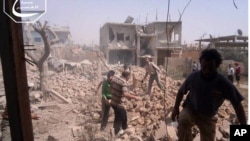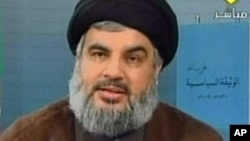WASHINGTON —
The civil war in Syria is taking a new, and possibly ominous turn, in the battle for Qusair, a small but strategic town near the frontier with Lebanon.
For the first time, the mainly Sunni Muslim rebels seeking to oust Syrian President Bashar al-Assad have been fighting Syrian troops backed by a large contingent of battle-hardened guerrillas from Hezbollah, the militant Lebanese Shia movement. Assad is a member of the Alawi Muslim sect, an offshoot of Shia Islam.
Some of the most effective units among the anti-Assad rebels trying to keep their hold on Qusair are from the Jabhat al-Nusra front, an al-Qaida affiliated group, many of whose members come from other Middle Eastern and Central Asian countries.
According to Western diplomats, a showdown between Hezbollah and al-Nusra fighters holds serious risks for Lebanon, threatening that country’s already fragile ethnic and religious balance. For the wider Arab world, clashes between the two groups also could aggravate already tensions between Shiites and Sunnis.
Foreign fighters’ battle
“You have got two of the most vicious factions in this war facing off over the most strategically important territory for the Assad regime and territory worthy for both sides of the most extreme fighting,” said Jonathan Schanzer, a Middle East specialist at the Foundation for Defense of Democracies in Washington. “This is a foreign fighters’ battle.”
Assad’s forces attacking from the north and Hezbollah from the south are thought now to have an edge at Qusair, having made inroads deep into the town. Even so, the revels say they still hold important districts.
Qusair lies at a junction between the Syrian capital of Damascus and the country’s third largest city Homs and could be a crucial if, as some regional experts suspect, Assad has a worst-case scenario plan of fashioning a rump Alawi state to the north and east of Lebanon.
But the fight in Qusair is taking its toll on Hezbollah, judging by the sudden increase in the number of martyrdom announcements from the Lebanese Shia movement and it supporters. Pro-Hezbollah Facebook pages that are vetted by the movement’s media department have been announcing newly fallen fighters, mostly saying they were “killed while performing jihad duties.”
Hezbollah announcing battle deaths
Some of the announcements mention Qusair as the location. Last weekend, more than 20 Hezbollah fighters were mourned on the Facebook pages as having fallen in battle. Rebel sources claim up to a hundred Hezbollah fighters have been killed in the past few days in and around the town.
“These announcements coincided with some of the heaviest fighting witnessed since the start of an over-a-month-long, combined pro-Bashar Assad, and Hezbollah offensive,” according to Aaron Zelin, a scholar at the Washington Institute for Near East Policy.
Hezbollah fighters and al-Nusra rebels have clashed elsewhere in Syria, in Homs and Aleppo, but in smaller scale fights. Hezbollah leaders have admitted in the past that their fighters have engaged in the conflict but said they were doing so as individuals.
In recent weeks, Hezbollah forces have been engaged in Shiite villages on the Syrian side of the border along a 50 kilometer stretch in the mountainous al-Nabk area about 80 kilometers north of Damascus, say Lebanese intelligence sources.
Nasrallah enters the fray
On April 30, Hezbollah leader Hassan Nasrallah edged closer to acknowledging publicly that the powerful Shia movement’s fighters were engaged in the civil war raging next door. In a televised address, he warned that Syria had “real friends.”
“You won’t be able to bring down Damascus and you cannot bring down the regime, militarily,” Nasrallah said, adding, “The battle will be long.”
With fighting intensifying in Qusair, medical clinics in the Hezbollah stronghold of the Bekaa valley made appeals for blood donations to help treat wounded Lebanese Shia fighters.
On Tuesday, a spokesman for the rebel Free Syrian Army (FSA) accused Nasrallah of responsibility for the carnage in Qusair.
“Hassan Nasrallah will be held personally responsible for the current situation because he in person is meeting with all of [his fighters] before they head to Qusair,” FSA spokesperson Louay Almokdad told Al Arabiya English.
The FSA’s military commander, General Salim Idris, has warned in the past that Hezbollah involvement would be met with retaliation and the targeting of its strongholds in Lebanon.
For the first time, the mainly Sunni Muslim rebels seeking to oust Syrian President Bashar al-Assad have been fighting Syrian troops backed by a large contingent of battle-hardened guerrillas from Hezbollah, the militant Lebanese Shia movement. Assad is a member of the Alawi Muslim sect, an offshoot of Shia Islam.
Some of the most effective units among the anti-Assad rebels trying to keep their hold on Qusair are from the Jabhat al-Nusra front, an al-Qaida affiliated group, many of whose members come from other Middle Eastern and Central Asian countries.
According to Western diplomats, a showdown between Hezbollah and al-Nusra fighters holds serious risks for Lebanon, threatening that country’s already fragile ethnic and religious balance. For the wider Arab world, clashes between the two groups also could aggravate already tensions between Shiites and Sunnis.
Foreign fighters’ battle
“You have got two of the most vicious factions in this war facing off over the most strategically important territory for the Assad regime and territory worthy for both sides of the most extreme fighting,” said Jonathan Schanzer, a Middle East specialist at the Foundation for Defense of Democracies in Washington. “This is a foreign fighters’ battle.”
Assad’s forces attacking from the north and Hezbollah from the south are thought now to have an edge at Qusair, having made inroads deep into the town. Even so, the revels say they still hold important districts.
Qusair lies at a junction between the Syrian capital of Damascus and the country’s third largest city Homs and could be a crucial if, as some regional experts suspect, Assad has a worst-case scenario plan of fashioning a rump Alawi state to the north and east of Lebanon.
But the fight in Qusair is taking its toll on Hezbollah, judging by the sudden increase in the number of martyrdom announcements from the Lebanese Shia movement and it supporters. Pro-Hezbollah Facebook pages that are vetted by the movement’s media department have been announcing newly fallen fighters, mostly saying they were “killed while performing jihad duties.”
Hezbollah announcing battle deaths
Some of the announcements mention Qusair as the location. Last weekend, more than 20 Hezbollah fighters were mourned on the Facebook pages as having fallen in battle. Rebel sources claim up to a hundred Hezbollah fighters have been killed in the past few days in and around the town.
“These announcements coincided with some of the heaviest fighting witnessed since the start of an over-a-month-long, combined pro-Bashar Assad, and Hezbollah offensive,” according to Aaron Zelin, a scholar at the Washington Institute for Near East Policy.
Hezbollah fighters and al-Nusra rebels have clashed elsewhere in Syria, in Homs and Aleppo, but in smaller scale fights. Hezbollah leaders have admitted in the past that their fighters have engaged in the conflict but said they were doing so as individuals.
In recent weeks, Hezbollah forces have been engaged in Shiite villages on the Syrian side of the border along a 50 kilometer stretch in the mountainous al-Nabk area about 80 kilometers north of Damascus, say Lebanese intelligence sources.
Nasrallah enters the fray
On April 30, Hezbollah leader Hassan Nasrallah edged closer to acknowledging publicly that the powerful Shia movement’s fighters were engaged in the civil war raging next door. In a televised address, he warned that Syria had “real friends.”
“You won’t be able to bring down Damascus and you cannot bring down the regime, militarily,” Nasrallah said, adding, “The battle will be long.”
With fighting intensifying in Qusair, medical clinics in the Hezbollah stronghold of the Bekaa valley made appeals for blood donations to help treat wounded Lebanese Shia fighters.
On Tuesday, a spokesman for the rebel Free Syrian Army (FSA) accused Nasrallah of responsibility for the carnage in Qusair.
“Hassan Nasrallah will be held personally responsible for the current situation because he in person is meeting with all of [his fighters] before they head to Qusair,” FSA spokesperson Louay Almokdad told Al Arabiya English.
The FSA’s military commander, General Salim Idris, has warned in the past that Hezbollah involvement would be met with retaliation and the targeting of its strongholds in Lebanon.












